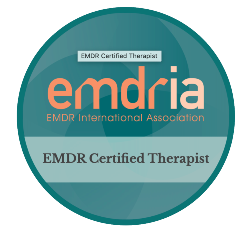The Impact of Complicated Grief
Grief is an extremely difficult emotion to handle, yet it is very much a part of life and loving. In spite of how common it is to the course of life, it can take a serious mental and physical toll on people, leaving them desperate for relief from the suffering. Although in most cases grief runs its course and is incorporated into a new perspective in a healthy way, there are times in which grief can become stuck. In these cases, the grief is considered complicated grief or prolonged grief, and may require professional assistance to heal.
Neurologically, our brains respond to grief similarly to the way the brain responds to trauma, creating symptoms that are much like PTSD, as we try to recover from the loss. The body reacts to the grief throwing us into survival mode. This process impacts memory, sleep, heart rate and cognition- creating what is sometimes called ‘brain fog.’ These physiological symptoms are in response to what studies have shown that our brains actually perceive grief as a threat to our safety and wellbeing, shutting down energy to systems for reasoning and decision making, conserving the energy for managing the trauma response and recovery system. This process is innate and normal, and for most individuals it improves over time.[1]

For some individuals the grief does not seem to improve, or can even worsen as they stay in survival mode, perpetually focusing on the lost loved one, creating what we call ‘complicated grief’ or ‘prolonged grief.’ This happens in about 10% of cases[2], and in these cases, it is particularly important that the individuals receive some professional help to navigate through the loss. As the focus on the loved one continues and is held in conjunction with stress and sadness, these neuronal pathways fire repeatedly strengthening them and perpetuating the problem and intervention is needed to help mitigate the pain and facilitate healing.
Although grief can look like PTSD or depression, and it takes on many of those characteristics, it is distinct from those disorders in terms of the way it needs to be treated. In fact, individuals can have both grief and depression, or grief and PTSD, or grief alone. Grief has unique components in that the loss is of someone that was loved and significant to them, creating the pain and suffering from the loved one’s absence and the change in the day to day life of the person left behind.
Treating the grief is not about eliminating it, but about helping the individual to incorporate the loss into their mental model of the world in a new and healthy way. In some ways, it can be compared to treating an eating disorder. You cannot eliminate food from someone in order to heal the disorder. We all need food to survive, but the individual needs to learn to incorporate food into their life in a healthy, nourishing way. When treating grief, the most successful treatments are going to help the individual to incorporate thoughts, and even moments of sadness when thinking of their lost loved one, into their life in a new and healthy way.
Symptoms of grief:
- Decrease in sense of self confidence
- Loss of interest in things that used to be enjoyable
- Feelings of numbness
- Feelings of shock and disbelief
- Sadness and despair
- Feelings of guilt
- Increase in feelings of anxiety
- Sense of loss of control
- Difficulty concentrating
- Difficulty in interpersonal relationships
Symptoms of complicated grief:
- Perpetual focus on loved one’s death
- Hyper focus on reminder of loved one or avoidance of reminders of loved one
- Extreme sorrow, pain and rumination about the loved one
- Intense and persistent longing for the loved one
- Difficulty accepting the loss
- Extreme anger and resentment about the loss
- Loss of meaning and sense of purpose
- Difficulty enjoying life
How EMDR therapy helps grief:
EMDR therapy can facilitate healthy grief by helping the brain to hold onto the positive memories of the loved one and while at the same time incorporating the loss of the loved one into the person’s narrative in a healthy way. EMDR activates numerous neurological functions that mimic the REM cycle of sleep in which the brain is making sense of stressful or confusing circumstances in one’s life. By activating the neurons in the brain that hold both negatively charged memories at the same time as tapping into adaptive, positive memories, the EMDR is stimulating the brain’s intrinsic capacity to heal and process through loss. In this way, the EMDR is not necessarily eliminating grief, but incorporating it into a new and healthy narrative of one’s life.
The process of healing grief can take time. However, if you are feeling it is simply too difficult to manage, reach out and talk to someone. Being in the presence of friends and family can help, or take some time to talk with a professional. There is life after loss. However, remember that it takes time, patience and often help, to get through it and begin to enjoy all that life has to offer.
[1] https://www.americanbrainfoundation.org/how-tragedy-affects-the-brain/
[2] Marie Lundorff, Helle Holmgren, Robert Zachariae, Ingeborg Farver-Vestergaard, Maja O’Connor. (2017) Prevalence of prolonged grief disorder in adult bereavement: A systematic review and meta-analysis. Journal of Affective Disorders, Volume 212, Pages 138-149.





